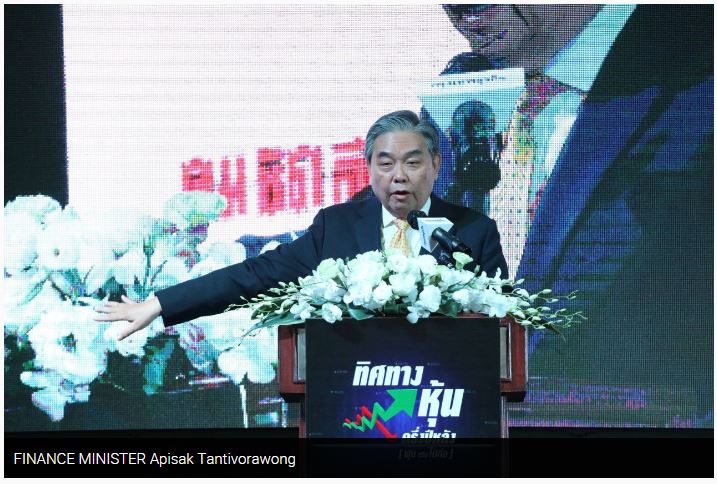Thailand: Govt’s fiscal expansion policy to continue to pursue infrastructure projects
FINANCE MINISTER Apisak Tantivorawong says the government is planning key policy actions in the second half of the year, ranging from fiscal expansion to debt restructuring for farmers, to further boost the economy and the country’s competitiveness.
Delivering his keynote speech at a seminar on “Direction of the SET Index in the second half 2018” hosted by Krungthep Turakij, a sister newspaper of The Nation, he admitted that public debt would peak in the next four years but assured it would be manageable.
Apisak said the government would continue to implement fiscal expansion in order to invest more in infrastructure projects.

The government will run a deficit of Bt450 billion for fiscal year 2019, which starts in October. It has run fiscal deficits for the past three years in order to invest more in key transportation projects but he assured that the public finances remained sound as public debt was only 40.4 per cent of gross domestic product (GDP).
Apisak, however, conceded that public debt would peak in the next four years, at about 48 per cent of GDP.
Although public debt will further rise, it will be kept below 60 per cent of GDP, considered in the safe zone that would not cause a cashflow shock, he said. Many countries in Europe, as well as Japan and the United States, have a public debt exceeding 100 per cent of GDP.
He also said that Thailand could have a balanced budget in the next 11 years. Apisak expressed his support for low interest rates in the second half of the year. “While some economists want the central bank to raise the rate, I don’t agree as inflation remains low,” he explained.
A rate rise would adversely affect many people who are just able to breathe after being under water for years, he said.
However, the minister said it was up to the Bank of Thailand, which is independent, to decide whether it wanted to keep the policy rate at the current 1.5 per cent or raise it.
To address the problem of the low income of 30 million farmers, Apisak said he would next week propose a debt-restructuring plan for farmers to the Cabinet.
Under the proposal, the state-owned Bank for Agriculture and Agricultural Cooperatives (BAAC) would allow farmers 2-3 years of debt moratorium, subsidised by a budget allocated by the government.
He said the measure would help about 2-3 million farmer families with a principal debt of not more than Bt 300,000 each. The government was also committed to reforming the farm sector in order to increase its competitiveness in the long term, Apisak stated.
He said he supported the Government Savings Bank’s debt restructuring for teachers with a combined debt of Bt450 billion. The GSB would use its own financial resources for this debt restructuring and the government would not be subsidising it, he clarified.
Apisak said he did not agree with the GSB taking legal action against teachers, as such a move could disqualify them from a career as a civil servant.
The government is reviewing a tax on motorcycles and also considering a low tax rate for engines with low gas emissions but a higher rate for higher gas emissions, according to Apisak.
Fuel taxes will also be revised aimed at reducing pollution, he said.
Apisak promised not to raise value-added tax from the current 7 per cent. To collect more tax revenue, the Revenue Department would increase its efficiency in tax collection but would not increase tax rates, he assured.
Apisak believed that a looming global trade war between major economies would have only a limited impact on the Thai economy, which is estimated to grow 4.5 per cent this year.
He said he was not worried about capital outflows from the country caused by the fear of trade wars and the US rate hike. He said capital inflows had been too much in the past few years, which had caused the baht to strengthen and hurt farmers who got less baht for their exports due to the strong local currency.
He added that the current weakening of the baht was a boon for farmers.
Pakorn Peetathawatchai, president of the Stock Exchange of Thailand, said investors should beware market volatility in the second half of the year.
He, too, was less worried about capital outflows from the equity market, saying that although foreign investors had sold Thai stocks, their holdings proportion in Thai stocks remained at about 30 per cent of total market capitalisation.
The SET will still play a key role in mobilising funds for investment in the country and neighbouring countries.
The SET will shortly introduce new financial products to serve investors. One would be depository receipts, which would allow investors to indirectly invest in foreign companies, he said. The other is the Thailand Future Fund, which will raise funds from investors for investment in infrastructure projects, he added.
Meanwhile, Nitinai Sirismatthakarn, president of Airports of Thailand (AOT ), said the tour boat tragedy in Phuket earlier this month would not have a significant impact on tourism.
Source: http://www.nationmultimedia.com/detail/Economy/30350443


 Thailand
Thailand




